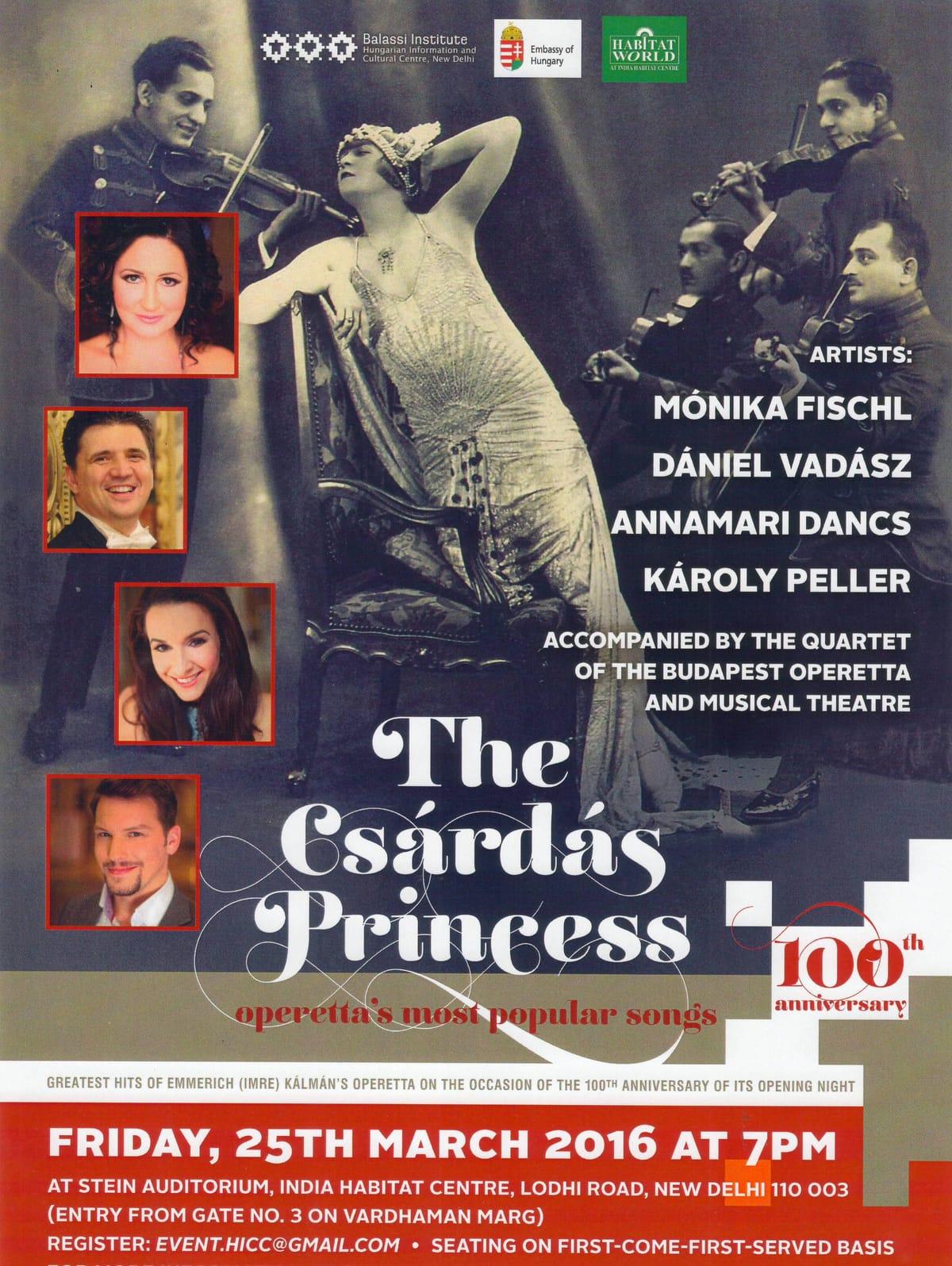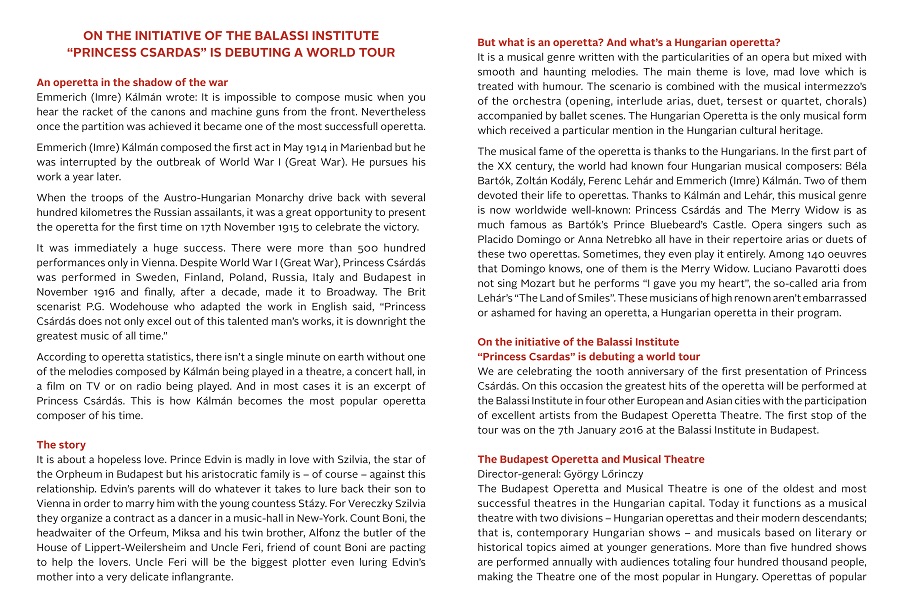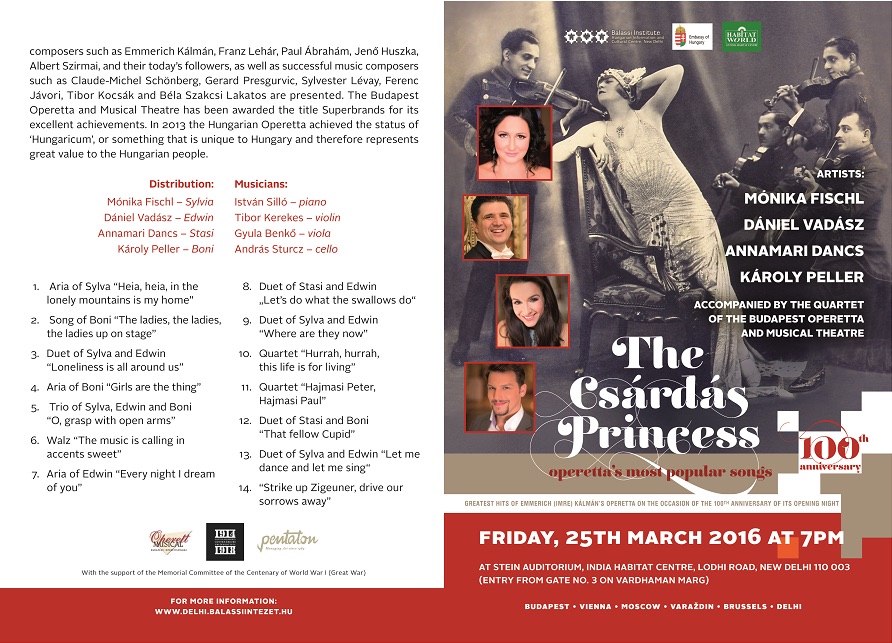Operetta from Hungary – THE CSARDAS PRINCESS

This Friday, 25th March at 7:00 pm at India Habitat Centre, Delhi witnesses an extravagant Operetta from Hungary – THE CSARDAS PRINCESS celebrating the 100th anniversary. Delhi stands the last station of the “Princess Csardas” debuting world tour.


ABOUT THE CSÁRDÁS PRINCESS
Music by Imre (Emmerich) Kálmán (1882-1953)
Premiere: Vienna, Johann Strauss Theatre, November 17th, 1915
THE CSÁRDÁS PRINCESS
Die Csárdásfürstin in German or A Csárdáskirálynő in Hungarian, The Csárdás Princess was translated into English as The Riviera Girl and The Gypsy Princess. This operetta in three acts by Hungarian composer Emmerich Kálmán (1882-1953) with the libretto by Leo Stein and Béla Jenbach premiered in Vienna at the Johann Strauss Theater on 17 November 1915, 100 years ago. The operetta is widely acclaimed and well-loved in Hungary, Austria, Germany, all of Europe, the USA, and particularly in former Soviet Union. Numerous film versions and recordings have been made. The Csárdás Princess is arguably Kálmán’s most successful work.
Emmerich Kálmán is one of the greatest composers of the operetta genre. His first piece, Ein Herbstmanöver or The Gay Hussars / Autumn Manoeuvres which premiered in 1908 in Budapest showed the talent of the young composer with this genre. Commissions for many theatres followed and seven more operettas were composed between the premieres of Ein Herbstmanöver in 1908 and The Csárdás Princess in 1915. The brilliant, passionate and sentimental Csárdás Princess is considered the peak of Kálmán’s creativity and one of the most important pieces in the history of operetta. The composer tried to give a certain dramatic profoundness to the plot line of the operetta and this is why The Csárdás Princess can perhaps be considered an operetta version of La Traviata with a happy ending. The rhythms of the waltz, czardas, a Hungarian folkdance named after a tavern and the foxtrot have been blended into the music of the operetta. The Csárdás Princess conquered the hearts of the audience in the dress rehearsal and the review published in Das Neue Wiener Journal after the successful premiere noted: “Kálmán has written very captivating music, the sound of his melodies offers an extraordinary lyrical pleasure!”
They say not a minute goes by in the world without a melody of Emmerich Kálmán being heard either on stage, on television, on the radio, at a concert or gala. And most often, no doubt, it is the melodies of The Csárdás Princess that one hears, the work for which the composer won first place among the leading composers of his era. It was not by chance that the operetta was performed 533 times at the original venue in Vienna after the 1915 premiere or that it was thereafter immediately presented in Sweden, Finland, Poland, Russia and Italy despite the world war. The Operetta It came to Budapest in November of 1916 and to Broadway a year later. Kálmán’s music was praised by the local librettist P. G. Wodehouse, “The Kálmán score was not only the best that the gifted Hungarian ever wrote, but about the best anybody ever wrote…”
The production of the Budapest Operetta and Musical Theatre – just like the original one in Vienna – toured the world. Audiences in Tokyo, Rome, Munich, Amsterdam, Berlin, Baden-Baden, Muscat and cities of Ukraine gave standing ovations, while Salzburg, Bucharest and Prague saw co-productions directed by KERO® with local stars. The Csárdás Princess was celebrating its 100th anniversary in 2015, and despite its age, the operetta remains a smash hit as the best and most-often performed played operetta in the world! We are sure that the songs of the world’s most known operetta piece will amaze our audience also at our concert!
IMRE (EMMERICH) KÁLMÁN AND THE CSÁRDÁS PRINCESS
by István Kállai
The life and career of the famous Hungarian composer, Emmerich Kálmán, is replete with the implications of but. He was born in Hungary, in Siófok, near Lake Balaton, but he spent most of his life abroad. Kálmán lived in Vienna, immigrated to America during the war, and died in Paris, but he considered himself a Hungarian throughout his life. He was born in October, 1882, but it was often the matter of serious family debates, whether he first saw the light of the world the 24th or the 25th of October. His father was a rich merchant, but he went bankrupt, and consequently Kálmán was raised in rather difficult circumstances. Kálmán wrote in his biography: “We lived in constant fear that someone would take everything away from us again. This horrible feeling has been haunting me throughout my entire life.”
At the age of fifteen, Emmerich was admitted to the preparatory program at the Hungarian Music Academy, because he wanted to be a pianist, but, because of a hand disorder, he had to quit playing the piano, and instead began studies in composing music. He graduated alongside Zoltán Kodály and Béla Bartók, and wrote his own classical pieces, but for want of a publisher, he desperately turned to composing operettas. Fortunately, his fantastic pieces have ever since conquered audiences from Austria to Australia. Kálmán’s never-ceasing international popularity is perhaps best summarized in the following quote: “They say not a single minute goes by in the world without a melody of Emmerich Kálmán being heard either on stage, television, radio or at a concert.”
However, Kálmán’s sister recalls the quite simple circumstances of the birth of Kálmán’s masterpieces: “Emmerich and the lyricists meet every day. They drink a few litres of black coffee, smoke cigars and cigarettes, tell jokes, talk of the weather, women, politics. They curse each other, they argue, scream and laugh. It goes on like this for months. Then, all of a sudden, there’s the operetta!” Of course, it wasn’t always this easy. In the spring of 1914, Emmerich Kálmán was visited by two of his good friends – lyricists with whom he often worked – Leo Stein, the famous comedy writer, and Hungarian-born Béla Jenbach, who started as an actor and later turned to writing operettas. They came with the idea of writing an operetta about a Hungarian chansonette who falls in love with an heir of a renowned noble family. The boldness of this idea is best showcased by the fact that after the opening night, the conservative press openly attacked the directory of the Royal Theatre, as well as the authors of the piece.
As the story goes, the family is, of course, outraged about the affair; and, in order to divide the lovers, they send the Prince to join the army, and hope to persuade him to become engaged to his childhood friend, Countess Stasi. The story could be called: Long Live Love! Kálmán welcomed the idea of the operetta, and so the lyricists started working on the libretto, which they delivered to him three weeks after their first meeting. Kálmán travelled to a quiet resort where he could work in tranquillity, but he couldn’t bring himself to compose properly. The atmosphere of the First World War weighed on him quite heavily. There was not enough food or fuel, and there were more and more stories about the terrible bloodshed and the good men lost in battle.
Finally, at the insistence of his old-time friend, Franz Lehár, Kálmán concentrated on composing the operetta and The Csárdás Princess premiered on the 17th of November, 1915 in the Johann Strauss Theatre. Continuing with an 800-run series in the Strauss theatre, The Csárdás Princess became one of the most successful operettas of all time. The Csárdás Princess appeared on the world stage with different titles. In St. Petersburg in in 1917, it was headlined as Sylva, and the operetta conquered English and American audiences as The Gypsy Princess or The Riviera Girl.
DISCOGRAPHY
The Csárdás Princess
Principals: Stasi, Sylva, Boni, Edwin, Feri.
1959 Herta Talmar, Renate Holm, Willy Hofmann, Fritz Wunderlich, Benno Kusche, Großes Operetten-Orchester, Conductor Franz Marszalek, CD, Philips.
1971 Olivera Miljakovic, Anneliese Rothenberger, Willi Brokmeier, Nicolai Gedda, Wolfgang Anheisser, Chorus of the Munchen Bayerischen Staatsoper, Graunke Symphony Orchestra, Conductor Willy Mattes, 2 CD, Emi.
1971 Dagmar Koller, Anna Moffo, Sándor Németh, René Kollo, Lászlo Mensáros, Graunke Symphony Orchestra, Conductor Bert Grund, CD, Deutsche Grammophon.
1985 Elisabeth Kales, Milena Rudiferia, Jack Poppell, Franz Wächter, Sándor Németh, Chorus and Orchestra of the Wiener Volksoper, Conductor Rudolf Bibl, CD, Denon.
1990 Roxane Hislop, Deborah Riedel, Roger Lemke, Anson Austin, Graeme Ewer, Australian Opera Chours, Australian Opera and Ballet Orchestra, Conductor Richard Bonyge, DVD, Opus Arte.
2002 Kerstin Grotrian, Vera Schoenenberg, Markus Werba, Ferdinand von Bothmer, Frigyes Harsányi, Chorus and Orchestra of the Mörbisch Festival, Conductor Rudolf Bibl, DVD, Videoland.
2002 Mojca Erdmann, Yvonne Kenny, Marko Kathol, Michael Roider, Karl-Michael Ebner, Slovak Philarmonic Choir, Chorus-master Marian Vach, Slovak Radio Symphony Orchestra, Conductor Richard Bonynge, 2 CD, Naxos.
THE BUDAPEST OPERETTA AND MUSICAL THEATRE
The Budapest Operetta and Musical Theatre is one of the oldest and most successful theatres in the Hungarian capital. In 1923 the City of Budapest decided to give the operetta genre a home of its own. With the opening of the Metropolitan Operetta Theatre, the Hungarian capital marked the beginning of a ‘Silver Operetta Era’ by giving a new and permanent home to the genre. In the history of the Metropolitan Operetta Theatre, the most important objective was to cherish the traditions of classic operetta while enriching it with modern artistic solutions. Next to Vienna, Budapest is the greatest capital of operetta. All who comes to the Metropolitan Operetta Theatre appreciate the high quality of the productions it presents.
Today the Metropolitan Operetta Theatre functions as a musical theatre with two divisions – Hungarian operettas and their modern descendants; that is, contemporary Hungarian shows – and musicals based on literary or historical topics aimed at younger generations. More than five hundred shows are performed annually with audiences totaling four hundred thousand people, making the Theatre one of the most popular in Hungary as judged by number of visitors. Operettas of popular composers such as Kálmán Emmerich, Franz Lehár, Paul Ábrahám, Jenő Huszka, Albert Szirmai, Szabolcs Fényes and their today’s followers, as well as successful music composers such as Claude-Michel Schönberg, Gerard Presgurvic, Sylvester Lévay, Ferenc Jávori, Tibor Kocsák, Béla Szakcsi Lakatos and Levente Szörényi are presented.
The works presented include famous operettas and musicals such as The Csárdás Princess, Countess Maritza, Ball at the Savoy, Baroness Lili, Mike the Magnate, Miss Saigon, Rebecca, Romeo and Juliet, Elisabeth, Mozart! and the world musical version of A Midsummer Night’s Dream. The creative teams of the theatre arrange one co-production after another with partner theatres in St. Petersburg, Bucharest, Yekaterinburg, Prague, Salzburg and Erfurt. The theatre company regularly goes on tour, performing in numerous cities in Europe and Asia with operettas, musical productions and gala performances. In the autumn of 2011 the Budapest Operetta and Musical Theatre won against numerous international rivals and secured the performing rights for the musical The Beauty and the Beast for German-speaking countries.
The Budapest Operetta and Musical Theatre has been awarded the title Superbrands for its excellent achievements in 2012, 2013, and 2014. The Theatre regularly organizes top-ranking international music competitions such as the Kálmán Emmerich International Operetta-Musical Composer Competition in 2012 as a sequel to the Ferenc Lehár International Operetta Competition and the Sylvester Lévay International Musical Singing Competition. In 2013 the Hungarian Operetta and Musical Theatre achieved the status of ‘Hungaricum’, or something that is unique to Hungary and therefore represents great value to the Hungarian people. It ranks among the National Treasures of Hungary.
PRINCIPALS
Mónika Fischl
Sylva
Mónika Fischl graduated from the Liszt Ferenc Academy of Music in 1997, where she majored in vocal studies. She sang her first opera role, Norina, from Donizetti’s Don Pasquale, in the National Theatre of Szeged as a senior at the university. Since she became a member of the company of Budapest Operetta and Musical Theatre in 1997, she starred in all major primadonna roles, including Zórika (Lehár: Gypsy Love), Hanna (Lehár: The Merry Widow), Liza (Lehár: The Land of Smiles), Adele (Strauss: Die Fledermaus), Szaffi, Arsena (Strauss: The Gypsy Baron), Annina (Strauss: A Night In Venice), Maritza (Kálmán: Countess Maritza) Victoria (Ábrahám: Victoria and her Hussar) and Odette (Kálmán: The Bayadere). She received an Artisjus Award for her portrayal of the role of Sylva (Kálmán: The Csárdás Princess) in 2009. The piece was previously recorded by German television station SWR in Baden-Baden’s Festspielhaus with her in the title role, which she reprised in 2002 in Seefestspiele, Mörbisch. She was also featured as Sylva in Budapest Operetta and Musical Theatre. The performance had been broadcasted live, and was later released on DVD by the Hungarian Television. In 2006, an audio recording was released from Kálmán’s famous piece, which achieved a gold record status in Hungary. Mónika Fischl made her debut in the Hungarian State Opera House in 1998 as Norina, while, in 2006, she was featured in Mozart’s The Magic Flute as the Queen of the Night, a role for which she was invited to a guest play in Germany. She sang the role of Gilda in Verdi’s Rigoletto under Tamás Pál’s conduction in the Palace of Arts, Budapest, and in Bayreuth, In 2012, she made her debut in Teatro Verdi Genova, in Traviata. She regularly performs in ‘Salute to Vienna’, an American-Canadian New Year’s concert, which last took place in New York’s Avery Fisher Hall. Mónika Fischl travelled the world’s stages with her repertoire, and sang in the most prominent concert halls of Japan, Asia, and America. On the 24th of October, 2012 (the Hungarian Operetta Day), she received the award for the best operetta actress of the season.
Zsolt Vadász
Edwin
Zsolt Vadász, who is one of the leading male soloists of the Budapest Operetta and Musical Theatre, did not aspire to be an actor or a singer, but nevertheless was always intrigued by the world of theatre, and especially music theatre. Vadász learned the basics of acting in Budapest Operetta and Musical Theatre’s acting studio. After graduation, he joined the company of the theatre in 2001. His first role was Ottokar in Der Zigeunerbaron. Vadász also starred in several roles in the National Theatre of Miskolc and in the Gárdonyi Géza Theatre, Eger. With the Budapest Operetta and Musical Theatre, Vadász was featured as Frick in La Vie Parisienne; Tassilo in Emmerich Kálmán’s Countess Maritza; István Baracs in Albert Szirmai’s Mike the Magnate; Rosillon in Franz Lehár’s The Merry Widow; and, as Eisenstein and Alfred in Strauss’s Die Fledermaus. Currently, Vadász stars in Pál Ábrahám’s Victoria and her Hussar; Emmerich Kálmán’s The Csárdás Princess, The Circus Princess and Countess Maritza; and Franz Lehár’s The Land of Smiles as the lead tenor. He is often featured in the theatre’s guest plays in Japan, the United States, Germany and Israel. Vadász is a regular guest player in other Hungarian operetta productions, and is also an internationally renowned opera singer. His classical repertoire consists of roles like Alfredo in Verdi’s La Traviata, Pinkerton in Puccini’s Madame Butterfly, and the tenor leads in Janacek’s Jenufa and Poulenc’s Dialogues of the Carmelites.
Annamari Dancs
Countess Stasi
One of the most popular and successful singers of Transylvania, Annamari Dancs started her career in 1990, when, during the four years of her conservatory studies, she travelled the Carpathian Basin as a soloist for Székely Mikó College Folk Ensemble. She started singing pop music in 1996, and since then has released more than 130 songs and studio recordings, 4 DVDs and 10 solo albums. In the last 15 years, she starred in 17 music videos, and performed more than 2000 shows in Transylvania, Hungary, Slovakia, The Netherlands, Sweden, Italy, United States and Canada. In 2006, she graduated from the Gheorghe Dima Music Academy of Cluj-Napoca as an opera singer and music teacher. In 2007, she decided to pursue a career in operetta. Since 2010, she is a regular guest artist in Ion Dacian National Operetta Theatre, where she is featured in the soubrette roles of the Romanian versions of Die The Csárdás Princess and Countess Maritza. She debuted in Budapest Operetta and Musical Theatre in the 2010/2011 season as Stasi in The Csárdás Princess, but later was trusted with new roles, including Kim from Miss Saigon, which featured her for the first time as a musical lead. In the next seasons, she starred in Countess Maritza, Józsiás, the Devil-Slayer and Victoria and her Hussar. Since the 2013/2014 season, she is featured as Pünkösdi Kató in The Kissing Lady and as Mi in The Land of Smiles. She has received several international, Transylvanian and Hungarian musical awards.
Dávid Szabó
Count Boni
He debuted on stage at the age of seven, and was featured in several musicals as a child actor. He was also a member of the child’s choir of the Hungarian State Opera. At the age of 15, he was admitted to Budapest Operetta and Musical Theatre’s Pesti Broadway Studio, from where he graduated in 2004. He feels at home in musical and operetta roles as well. His most important roles in Budapest Operetta and Musical Theatre: Romeo and Juliet (Mercutio), Baroness Lili (Frédi), Elisabeth (Rudolf), West Side Story (Baby John), The Merry Widow (Raoul de Saint Brioche), The Csárdás Princess (Boni), Die Fledermaus (Prince Orlowsky), Altar Boys (Abraham), Szapáry (The Bayadere), Nick Bottom, Demetrius (A Midsummer Night’s Dream), Tony Schlumberger (The Circus Princess), Feri Hadfaludy (The Land of Smiles). He played Mario in János Vajda’s contemporary opera, Mario and the Magician. He was featured several times in the guest shows of Budapest Operetta and Musical Theatre in the theatres and concert halls of Frankfurt, Munich, Nurnberg, Shanghai, Brunei, Manila, Cambodia, Laos, Vietnam, Thailand, Malaysia, San Diego, Los Angeles and numerous Japanese cities. He also starred in the guest plays of The Csárdás Princess and Die Fledermaus, and in popular Hungarian movies. In 2007, he was awarded with Budapest Operetta and Musical Theatre’s Marshall’s Baton prize for young talents. In the singing talent show The X Factor Hungary, he was one of the four finalists, yet – despite having started his commercial music career – he is still regularly featured in the productions of Budapest Operetta and Musical Theatre.





